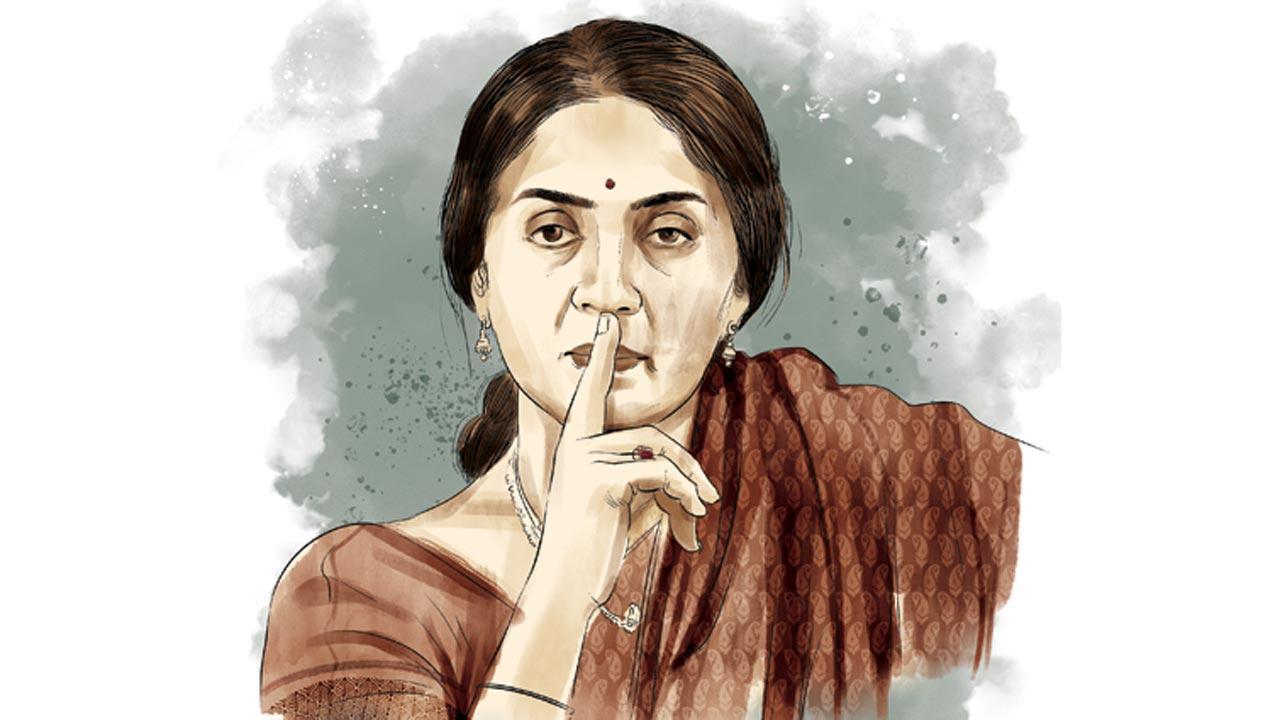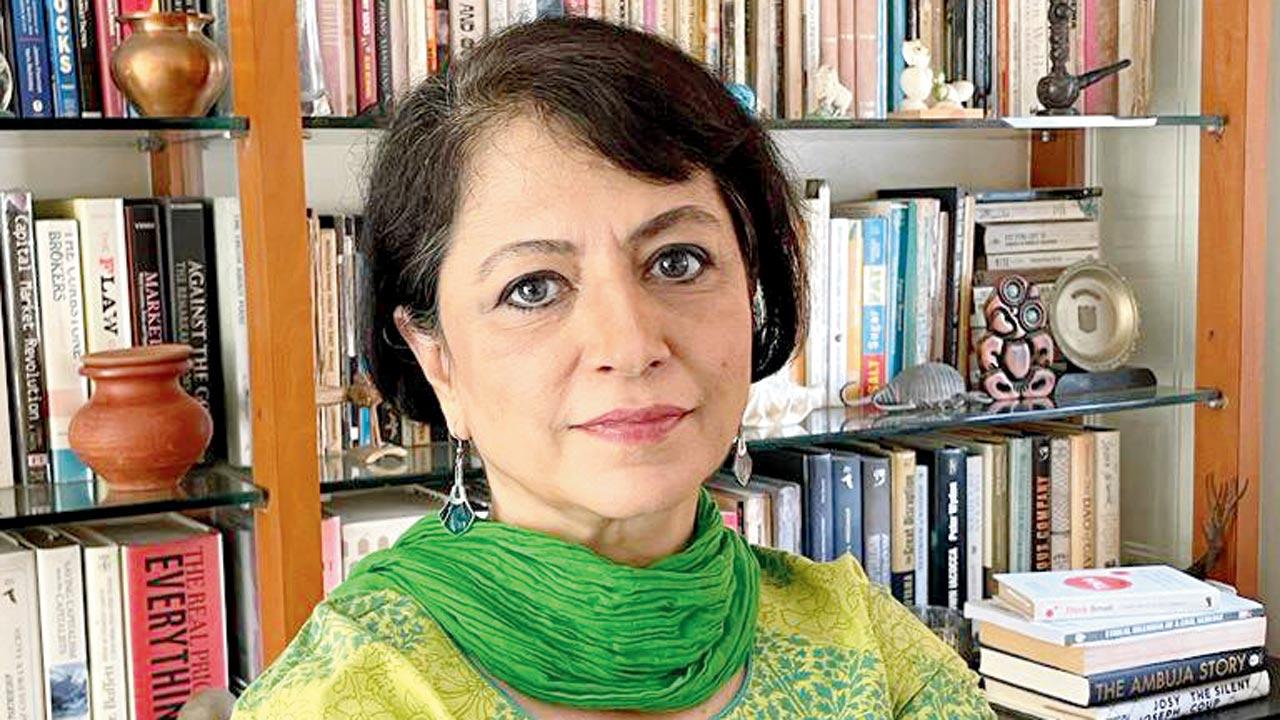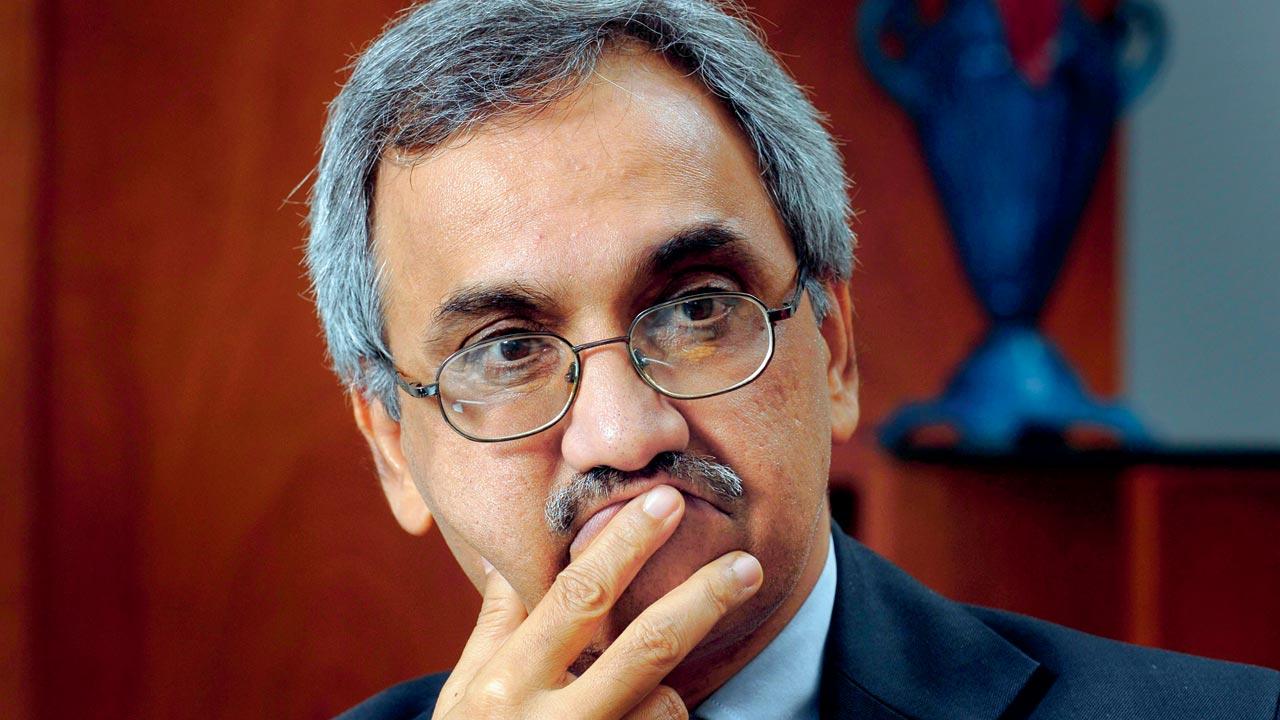In the wake of bizarre misconduct allegations against former NSE CEO Chitra Ramkrishna and the ‘faceless’ yogi she trusted, veteran journalist and author Sucheta Dalal on why the giddy high of absolute power can only bring bad news

Dalal says Ramkrishna’s own appointment as NSE’s MD in 2013 was manipulated and she ran the Exchange Exchange like a private fief. Illustration/Uday Mohite
When you see a picture of Chitra Ramkrishna, you will agree with reports that she plays the veena and tries not to miss Chennai’s winter Carnatic concert season. The Kanjeevarams, simply done ponytail and make-up free face relay an image of a no-nonsense, committed leader.
ADVERTISEMENT
What you don’t expect is the news that broke on February 17. Ramkrishna, one of the Indian financial sector’s most respected names, was accused of misusing her position as then Managing Director and CEO of the National Stock Exchange (NSE) to make inappropriate appointments, sharing confidential information with an unidentified spiritual guru who she admitted lives somewhere in the Himalayas and who she first met on the banks of the Ganga, and allowing him to influence her actions related to operations of the exchange.
 Sucheta Dalal
Sucheta Dalal
The Central Bureau of Investigations raided her Mumbai property and issued a lookout circular in a 2018 case where it was alleged that she supported the tinkering of the server architecture of the Exchange in order to allow a private company access to data before any other broker. Ramkrishna claimed during the investigation that the colocation facility was extended when her predecessor Ravi Narain was at the helm. An investigation by the regulator, Securities and Exchange Board of India (SEBI), revealed that it was the yogi who was in fact, running the NSE through her, taking a call on promotions, including the hiring of Anand Subramanian, who was appointed Group Operating Officer, a position most say he didn’t deserve. Last Friday, news broke confirming an even more bizarre allegation, with the arrest of Subramanian. He is in fact, the yogi who created an email ID to which Ramkrishna sent mails.
The NSE board is believed to have hushed up the matter when it came to light, allowing her to step down in 2016 instead of axing her. Narain resigned a year later in 2017.
 Ravi Narain, who was MD and CEO of NSE from 1993 to 2013, has been blamed by Ramkrishna during interrogation for commencing the colocation facility. Pic/Getty Images
Ravi Narain, who was MD and CEO of NSE from 1993 to 2013, has been blamed by Ramkrishna during interrogation for commencing the colocation facility. Pic/Getty Images
While we are certain that writing teams at OTT production houses are already onto this case for their next project, Mumbai-based investigative journalist and author Sucheta Dalal seems to have preempted this fall from grace. In a successful book she co-authored with her husband Debashis Basu, Absolute Power: Inside story of the National Stock Exchange’s amazing success, leading to hubris, regulatory capture and algo scam, Dalal scrutinised the changes in capital market regulation and infrastructure after the Harshad Mehta scam. Ironically, one of these was to set up NSE as a cleaner alternative to the Bombay Stock Exchange.
In an email interview with mid-day, Dalal, who is managing editor of Moneylife Magazine, discusses the equation between Ramkrishna and Subramanian, and how many beyond the two had hoped to profit from the NSE’s inroads into corridors of power.
Edited excerpts from the interview.
Was Chitra Ramkrishna knowingly and willingly involved in the wrongdoing or was she simply a representative of an organisation that rode on misgovernance?
I have been a journalist for over 35 years and have covered the capital markets right through. Chitra Ramkrishna was part of the founding team at the National Stock Exchange (NSE) when it was set up in 1992. So, I have known her for over 20 years. However, I did not know her, personally. I was more in touch with Dr RH Patil, who founded NSE, and Ravi Narain, who went on to become the vice-chairman. We have written a lot about Chitra in our book—how she started with the debt segment of the market, her own strange appointment, which was also fudged by the powerful committee at NSE by the way, and later, the arrogance with which she conducted herself.
But it wasn’t just her. She was the only person left without a chair when the music stopped.
The NSE has to be seen in perspective—the phenomenal work that it did for the first 10 years since its founding and how it helped transform India’s capital market cannot be ignored. The decline happened when its success led to a position of absolute power. In the language of the markets, it is called ‘regulatory capture’, where the regulated entity becomes bigger and more powerful than the regulator. In NSE’s case, it happened with full collusion of the finance ministry and some key bureaucrats, prior to 2015. As far as I am concerned, I think that the bigger issue that is going unaddressed is what we call the colocation scam, where some large traders got illegal access to the NSE servers, allowing them to reap thousands of crores in illegal profits. This is being systematically buried by the regulator.
Was there any evidence if the ‘faceless yogi’ who was giving Ramkrishna directions then?
No. There was absolutely no public information about any ‘yogi’. But her strange equation with Anand Subramanian and how he was brought in from a travel company’s subsidiary (Transafe Services Ltd, a subsidiary of Balmer Laurie) where he earned just R15 lakh, to become NSE’s GOO at a package of over Rs 1.68 crore, that too as consultant working only four days a week, was known. In the next three years, he received multiple increments and re-designations and an increase in perks until his cost to the NSE was about R5 crore. He was allowed to work four-five days a week, and spend the weekends in Chennai. His wife Sunitha Anand headed the Chennai office, and also received the same pay hikes. More importantly, since he has no background or experience in running an exchange or technology, he was not mentioned as a Key Management Person to the Securities & Exchange Board of India (SEBI) as required by the law.
Now that these allegations have surfaced, in retrospect, does all that you found make sense?
There is a lot that is wrong with the NSE and how it functioned, first under Ravi Narain and later under Chitra Ramkrishna. There is also a lot about how the regulator and the finance ministry colluded with them. We have documented this saga in detail [in the book]. Other topics that require highlighting are how Chitra Ramkrishna’s appointment as NSE’s MD in 2013 was manipulated and how she ran the Exchange like a private fief; how NSE was repeatedly let off with a warning for serious violations such as fat-finger crash and client code modification; how SEBI buried the algo or colocation scam by first asking the NSE to fix responsibility, which the NSE failed to do and then deliberately issuing weak show-cause notices; and how the scandalous appointment and exit of Anand Subramanian was an egregious example of what was happening at the Exchange.
What’s at the centre of this mess?
Eventually, the motivation for all wrongdoing is greed and power. So yes, it played a big role, once there was unlimited power and no control or supervision. It is also a failure of the government and regulator.
British historian Lord Acton said famously, “Power tends to corrupt and absolute power corrupts absolutely.” In reference to Harshad Mehta, you had once said, “I guess there is nothing surprising about it. People who made easy money wanted the happy days to continue”. Was this the case with Chitra Ramkrishna too?
Yes. The motivation of those in the finance ministry who allowed NSE to become this monster has to be personal. It is an extraordinarily profitable exchange with a phenomenal operating margin of over 70 per cent. There are plenty of people in the system who have managed to get NSE shares—even when it is unlisted at just Rs 1,000-Rs 1,200/ share—and expect the valuation to jump at least five times or more when it gets listed and their role has to be investigated. These include officials and bureaucrats. Many may have their holdings routed through foreign institutional investors.
What is the future of the NSE?
The NSE is an important institution. It is the largest derivatives exchange in the world. It is in our interest, as Indians, that it should be cleaned up, made accountable, submit to the Right to Information Act, improve its risk management systems and once again become an institution that we can take pride in. It has had an astonishing 30 broker defaults in just over two years, which has left tens of thousands of investors with huge losses—which I estimate at over R5,000 crore. All this needs to be looked into. People involved in the 2015 colocation scam continue in senior posts. The slow-dragging investigation and legal challenges will prevent a full clean up and a fresh start. But if the Prime Minister’s Office takes an interest and ensures that SEBI, as the regulator, shows spine, then a full clean up is certainly possible.
 Subscribe today by clicking the link and stay updated with the latest news!" Click here!
Subscribe today by clicking the link and stay updated with the latest news!" Click here!







